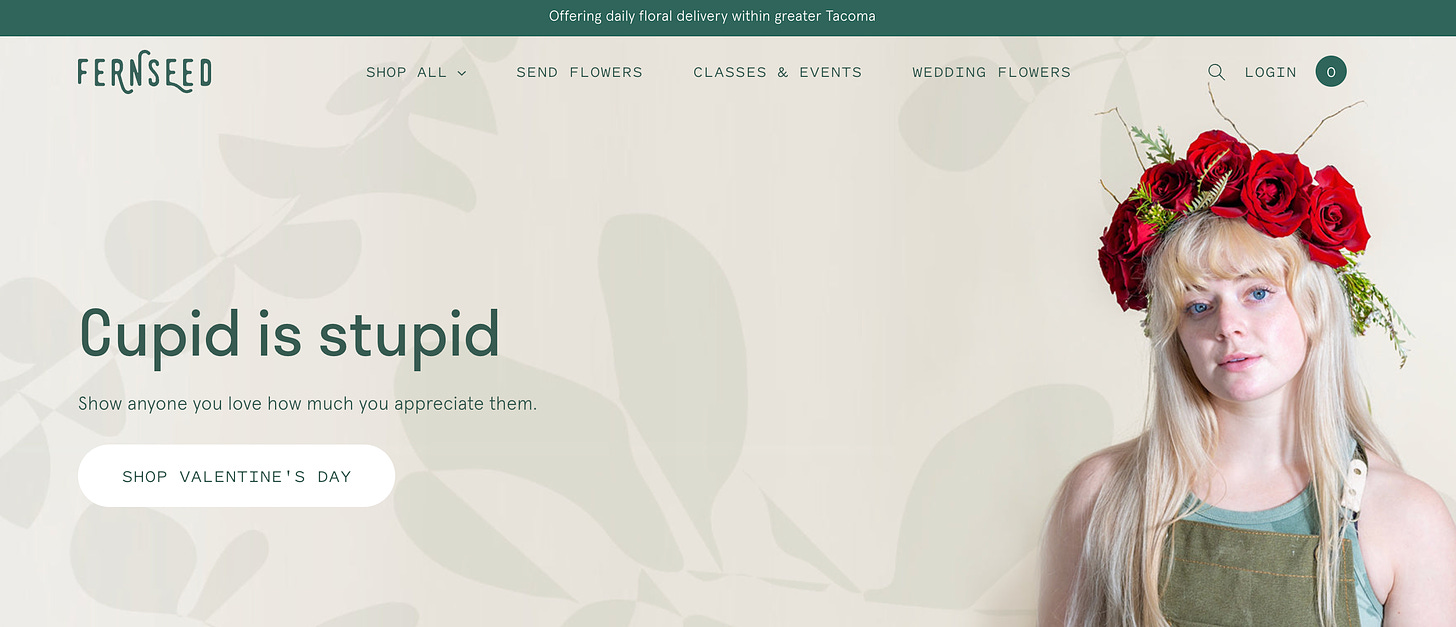Should you ask your subscribers if they want to opt-out of Mother's Day marketing?
Some thoughts about how to market holidays consciously and inclusively
I’ve worked in retail for a good portion of my life, and my partner worked in restaurants, so I've never placed a lot of importance on holidays. When everyone else's day off is your (busy) day on, you tend to mentally opt out of celebrations. Combine that with being a child of divorce, and I’d say I’ve developed a general sense of detachment about most holidays, as if they don't apply to me. But I (thankfully) don't associate them with trauma or loss.
Then my mom died in February.
Weird things go through your head when someone close to you is dying, and I remember thinking, "Is Mother's Day going to be triggering to me now?" Because I own a flower shop, I’m pretty familiar with the concept that Mother's Day isn't a happy occasion for a lot of people. Not everyone has a relationship with their mother. Some people would like to be mothers and cannot. Some people are mothers to children who are no longer living. So yeah, Mother’s Day can be a real mental minefield for people.
Given my existing sense of holiday detachment bordering on resentment, I’ve always had a distaste for marketing commercialized occasions. But when you own a flower shop on Mother’s Day (Valentine’s Day, too), you’d be ridiculous to forgo holiday marketing altogether.
So I try to find a balance between leaning into the excitement some people are privileged to enjoy at holidays while attempting to ensure people who don’t feel that excitement aren’t excluded. Last year, as I was trying to update our homepage for Valentine’s Day, I ended up keeping the placeholder copy I wrote in the initial design that read, “Cupid is stupid.” I wasn’t sure about it at first (I wrote it sardonically?), but our floral manager gasped when she saw it. “It’s PERFECT, leave it!”

We were further validated when a middle-aged woman stopped in to pick up Valentine’s Day flowers she ordered and told us, “I bought these for myself, specifically because of your ‘Cupid is stupid’ message. I loved that, thank you.”
I have to admit I was a bit behind the trend when it came to the idea of giving subscribers the option of opting out of Mother’s Day marketing altogether. I saw my first optional opt-out email from a brand I follow this year, but I guess the practice has been around long enough to be praised and (of course) criticized.
Because we’re such a small shop, I thought the technology required to engineer a temporary opt-out was probably beyond our reach. I’m used to Shopify not offering a lot of basic functionality we require to manage our website, inventory, and point of sale system. But we use Klaviyo for our email marketing, and when I checked their knowledgebase, I discovered setting up a temporary opt-out for any campaign is actually quite easy. So I’m planning to offer our subscribers the option to opt-out of Mother’s Day marketing this year.
The main criticisms of opt-out campaigns are that even offering the option can be triggering and further isolating, and that companies use the opt-out as a virtue signal. I think both of these critiques are a stretch.
The goal of allowing opt-out isn’t to tiptoe around Mother’s Day as if anyone who associates it with loss should be handled with kid gloves. Our subscribers have agency. When we offer anyone the option to choose what marketing messages they receive, we’re engaging in a collaborative marketing process where markets are conversations rather than one-way advertising blasts. The ability to have this two-way conversation between audience and businesses, and the consent inherent in it, is a foundational promise of the early internet and a recognized best practice since the web’s early days.
Anyone doing the right thing can be accused of virtue signaling, but whether the argument has merit has more to do with the intention and substance than the practice. If Fernseed allows subscribers to opt-out of Mother’s Day emails from within the privacy of their email inbox, we’re not doing anything different from our current approach which allows self-segmentation based on interest and the ability to opt-out from all marketing. It’s not like the only people opting out of Mother’s Day emails have negative associations with the holiday, either. They may just not have an interest, so don’t want to get the next few emails about it. Great! Leave them off the list.
However, if I were to send a press release to the Tacoma News-Tribune to bring attention to the fact that Fernseed, a virtuous flower shop in town, is allowing customers to opt-out of Mother’s Day marketing, that would be a virtue signal. The difference is whether I’m centering the experience of my subscribers or whether I’m centering the business in the conversation.

I assume some subscribers will opt out, but it’s not like once they’ve removed themselves from our marketing list I’ll go back to hyper commercialized language. (Great! They’re gone! Back to the “Don’t forget the most important person in your life” messaging!)
I read a post by Astrid Bracke on Substack recently about adjusting your business marketing so it’s aligned with your own taste and comfort level. I loved it because it addressed this idea that a lot of small business owners have a level of discomfort with marketing—and it’s different for everyone.
I’m cool with marketing in general. I don’t view it as a necessary evil. At my most inspired, I think about Fernseed’s marketing like a zine. Zines are a mix of news, how-to, cultural reporting, and—my favorite—rants. And zines are personal, but in a way that predates girl boss culture and personal brand building. Zines were (and still are) a tangible, photocopied endorsement of Things That Are Not Bullshit.
Bullshit is selling people things they don’t want or need.
Bullshit is selling things you don’t believe in.
However, it’s not bullshit to sell anything at all (something, I would argue, zines got wrong sometimes).

We all have our own bullshit meters and they’re calibrated differently. I think as long as your own bullshit meter isn’t radioactively pulsating as you’re writing marketing content for your shop, it doesn’t matter how other people perceive your marketing. They can always opt out if it’s not for them.
I don’t think there is right or wrong way for small retailers to market holidays. Small shops are regional, independent reflections of what is important to the people who start, work and shop in them, and that is what makes them globally important. It’s also why we are allowed to maintain a personal voice, so if you want to say Merry Christmas instead of Happy Holidays, go for it. If you think allowing customers to opt out of holiday emails is performative or snowflakey or just too complicated, don’t do it. You be you.
In my business, I don’t feel comfortable commercializing holidays unless I’ve drilled down to the ultimate why. That’s my bullshit meter at work.
I wasn’t comfortable marketing Valentine’s Day until I reframed it as a celebration of love in all its forms, especially self love.
This year I thought about Mother’s Day as an opportunity to reflect on the role of Mother, a day that even those of us who are feeling grief about it can participate in.
But it’s also fine with me if someone wants to opt out of my thoughts on it entirely.




